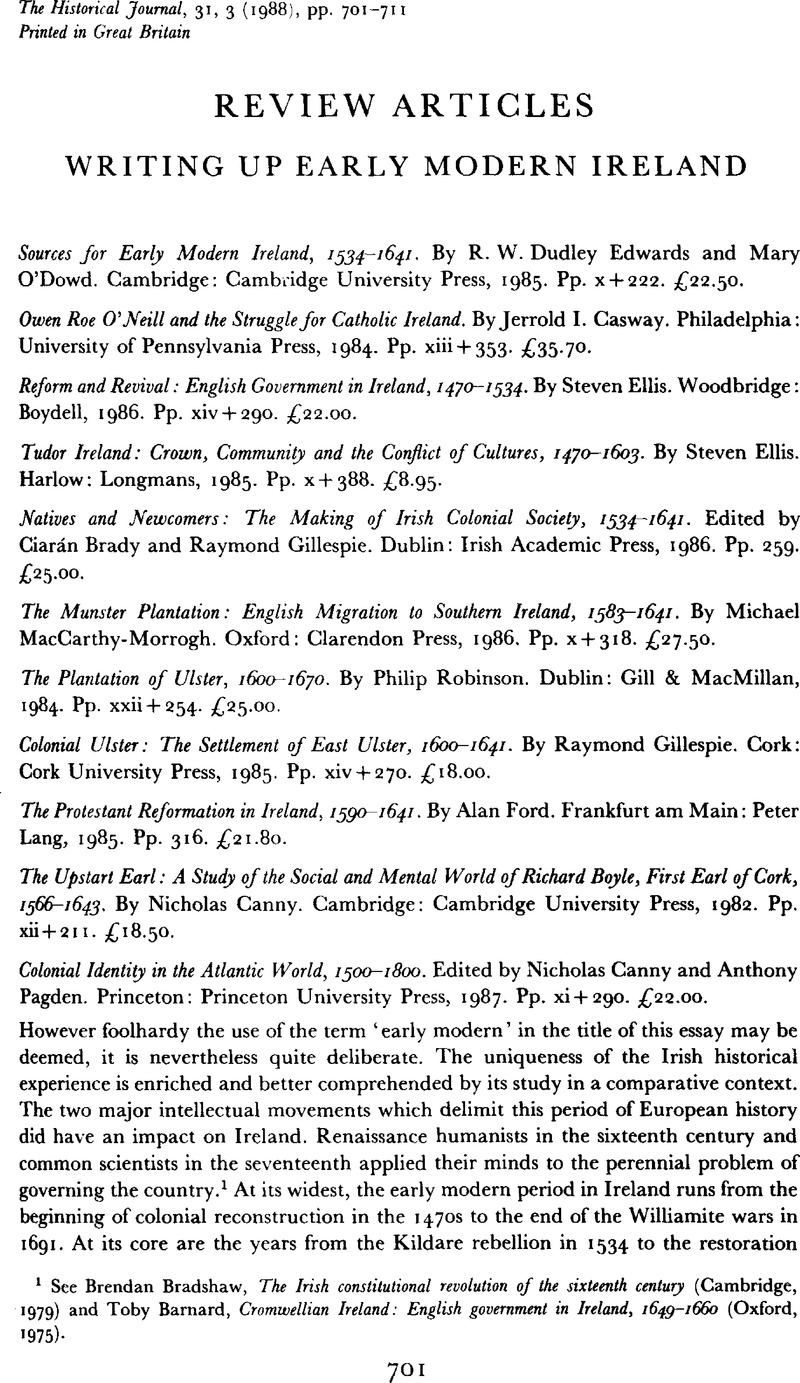No CrossRef data available.
Published online by Cambridge University Press: 11 February 2009

1 See Bradshaw, Brendan, The Irish constitutional revolution of the sixteenth century (Cambridge, 1979)CrossRefGoogle Scholar and Barnard, Toby, Cromwellian Ireland: English government in Ireland, 1649–1660 (Oxford, 1975)Google Scholar.
2 Leland, Thomas, A history of Ireland from the invasion of Henry II(3 vols., Dublin, 1773)Google Scholar.
3 Mitchell, John, Life and times of Aodh O'Neill (Dublin, 1846)Google Scholar; Froude, J. A., The English in Ireland in the eighteenth century (3 vols., London, 1872–1874)Google Scholar.
4 O'Grady, Standish, Red Hugh's captivity (London, 1886)Google Scholar.
5 Bagwell, Richard, Ireland under the Tudors (London, 1890–1895)Google Scholar and Ireland under the Stuarts (London, 1909–1916)Google Scholar; Butler, W. F. T., Confiscation in Irish history (Dublin, 1917)Google Scholar and Gleanings from Irish history, (London, 1925)Google Scholar.
6 For example, Cunningham, Bernadette, ‘Political and social change in the lordships of Clanricard and Thomond, 1569–1641’ (unpublished M.A. thesis, University College, Galway, 1979)Google Scholar and Morgan, Hiram, ‘The outbreak of the Nine Years War: Ulster in Irish politics, 1583–96’ (unpublished Ph.D. dissertation, University of Cambridge, 1987)Google Scholar.
7 See O'Riordan, Michelle, ‘The Gaelic mind and the collapse of the Gaelic world: a study of the motifs in bardic poetry’ (unpublished Ph.D. dissertation, University College, Cork, 1985)Google Scholar.
8 Brady, Ciarán, ‘The government of Ireland, c. 1540–1583’ (unpublished Ph.D. dissertation, Trinity College, Dublin, 1980)Google Scholar.
9 See also Perceval-Maxwell, M., The Scottish migration to Ulster in the reign of James I (London, 1973)Google Scholar and McCall, Timothy, ‘The Gaelic background to the settlement of Antrim and Down, 1580–1641’ (unpublished M.A. dissertation, Queen's University of Belfast, 1982)Google Scholar.
10 See also Elton, G. R., ‘Contentment and discontentment on the eve of colonisation’ in Studies in Tudor and Stuart politics and government, III (Cambridge, 1983), pp. 332–43CrossRefGoogle Scholar and Morgan, Hiram, ‘The colonial venture of Sir Thomas Smith in Ulster, 1571–75’, Historical Journal, XXVII (1985), 261–78CrossRefGoogle Scholar.
11 Anonymous, ‘The supplication of the blood of the English most lamentably murdred in Ireland, cryeng out of the yearth for revenge’, c. 1598–1599, British Library, Add. MS 34, 313 fos. 84–121Google Scholar.
12 ‘Book set down in writing by the Archbishop of Cashel’, 30 May 1592, Cal.State Papers, Ireland, iv, 489–502.
13 Canny, Nicholas, ‘Early modern Ireland: an appraisal appraised’, Irish Economic and Social History, v (1977), 56–65CrossRefGoogle Scholar.
14 Greenblatt, Stephen, Renaissance self-fashioning: from More to Shakespeare (Chicago, 1980)Google Scholar.
15 The only book on this subject, Seymour, St John D., Irish witchcraft and demonology (Dublin, 1913)Google Scholar, is woefully inadequate.
16 See also Bottigheimer, Karl, ‘Kingdom and colony’ in Andrews, K. R., Canny, N. P. & Hair, P. E. H. (eds.), The Westward Enterprise: English activities in Ireland, the Atlantic and America, 1480–1650, (Liverpool, 1978), pp. 45–64Google Scholar.
17 Moryson, Fynes, An itinerary (London, 1617), III, iii, 159Google Scholar.
18 These extravagant remarks are possible because the scholarship on disease and environment in early modern Ireland is so inadequate; for example, see Logan, Patrick, ‘Pestilence in the Irish wars: the early phase’, Irish Sword, VII (1966), 279–90Google Scholar.
19 Jones, F. M., ‘The Counter-Reformation’, in Corish, P. J. (ed.), History of Irish Catholicism (Dublin, 1967), III, 7Google Scholar.
20 See Pawlisch, Hans, Sir John Davies and the conquest of Ireland: a study in legal imperialism (Cambridge, 1985)CrossRefGoogle Scholar.